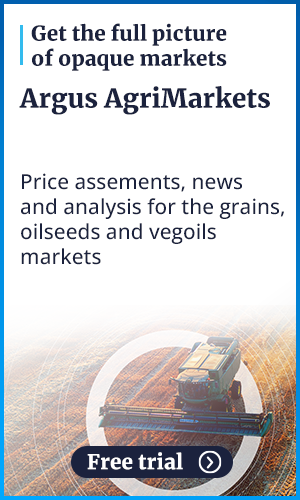| Paris | Chicago | |
|---|---|---|
| Wheat | - 1 €/t | - 7 cents |
| Corn | - 1 €/t | - 3 cents |
| Rapeseed | - 1 €/t | |
| Soybean | - 6 cents |
| €/$ | 1,1826 $ |
| Oil WTI | 62,84 $/b |
| Wheat (€/t) | |||
|---|---|---|---|
| Mars 26 | 190,50 | -1,00 | |
| Mai 26 | 190,25 | -1,00 | |
| Sept. 26 | 194,00 | -0,75 | |
| Déc. 26 | 201,00 | -0,50 | |
| Mars 27 | 205,50 | -0,50 | |
| Corn (€/t) | |||
|---|---|---|---|
| Mars 26 | 189,00 | -0,25 | |
| Juin 26 | 188,50 | +0,00 | |
| Août 26 | 192,00 | -0,50 | |
| Nov. 26 | 193,00 | -0,50 | |
| Mars 27 | 195,25 | +0,00 | |
| Rapeseed (€/t) | |||
|---|---|---|---|
| Mai 26 | 489,00 | -2,50 | |
| Août 26 | 464,50 | -2,50 | |
| Nov. 26 | 467,25 | -2,25 | |
| Févr. 27 | 468,50 | -1,75 | |
| Mai 27 | 468,75 | -2,50 | |
17/02/2026
| Wheat (€/t) : 4775 lots | |||
|---|---|---|---|
| Lots | Type | Strike | |
| 50 | Call Mai 26 | 190,00 | |
| 50 | Call Mai 26 | 200,00 | |
| 640 | Call Sept. 26 | 195,00 | |
| 340 | Call Sept. 26 | 205,00 | |
| 300 | Call Sept. 26 | 210,00 | |
| 14 | Call Déc. 26 | 222,00 | |
| 1 | Call Déc. 26 | 230,00 | |
| 600 | Call Mars 27 | 210,00 | |
| 720 | Call Mars 27 | 220,00 | |
| 100 | Put Mai 26 | 200,00 | |
| 340 | Put Sept. 26 | 175,00 | |
| 300 | Put Sept. 26 | 185,00 | |
| 600 | Put Mars 27 | 180,00 | |
| 720 | Put Mars 27 | 200,00 | |
| Corn (€/t) : 1500 lots | |||
|---|---|---|---|
| Lots | Type | Strike | |
| 500 | Call Juin 26 | 190,00 | |
| 500 | Call Juin 26 | 200,00 | |
| 500 | Put Juin 26 | 180,00 | |
| Rapeseed (€/t) : 669 lots | |||
|---|---|---|---|
| Lots | Type | Strike | |
| 2 | Call Mai 26 | 480,00 | |
| 200 | Call Mai 26 | 500,00 | |
| 4 | Call Mai 26 | 510,00 | |
| 300 | Put Mai 26 | 460,00 | |
| 9 | Put Mai 26 | 465,00 | |
| 4 | Put Mai 26 | 490,00 | |
| 150 | Put Août 26 | 450,00 | |
| Wheat (¢/b) | |||
|---|---|---|---|
| Mars 26 | 552,5000 | -9,7500 | |
| Mai 26 | 558,5000 | -5,2500 | |
| Juil. 26 | 566,5000 | -5,0000 | |
| Sept. 26 | 578,2500 | -5,5000 | |
| Déc. 26 | 595,7500 | -4,2500 | |
| Corn (¢/b) | |||
|---|---|---|---|
| Mars 26 | 431,2500 | -5,2500 | |
| Mai 26 | 441,7500 | -6,0000 | |
| Juil. 26 | 449,7500 | -5,7500 | |
| Sept. 26 | 449,5000 | -5,7500 | |
| Déc. 26 | 464,0000 | -4,7500 | |
| Soybean (¢/b) | |||
|---|---|---|---|
| Mars 26 | 1137,2500 | +1,7500 | |
| Mai 26 | 1152,2500 | +1,5000 | |
| Juil. 26 | 1163,7500 | +2,2500 | |
| Août 26 | 1152,2500 | +4,0000 | |
| Sept. 26 | 1119,5000 | +4,0000 | |
| Soy meal ($/st) | |||
|---|---|---|---|
| Mars 26 | 307,9000 | -3,7000 | |
| Mai 26 | 312,8000 | -3,0000 | |
| Juil. 26 | 316,9000 | -2,0000 | |
| Août 26 | 316,9000 | -1,5000 | |
| Sept. 26 | 316,0000 | -0,8000 | |
| Soy oil (¢/lb) | |||
|---|---|---|---|
| Mars 26 | 57,5400 | +0,2700 | |
| Mai 26 | 57,9100 | +0,3500 | |
| Juil. 26 | 58,0200 | +0,4500 | |
| Août 26 | 57,6700 | +0,4500 | |
| Sept. 26 | 57,2100 | +0,4900 | |
18/02/2026
| Physical (€/t) | |||
|---|---|---|---|
You can now find the prices for the Wheat delivered Rouen - (July basis) in the Argus AgriMarkets report FIND OUT MORE HERE >> | |||
| Durum wheat delivered La Pallice Spot - July 2025 basis | 235,00 | +0,00 | |
| Corn delivered Bordeaux Spot - July 2025 basis | 184,00 | -6,00 | |
| Corn FOB Rhin Spot - July 2025 basis | 192,00 | +1,00 | |
| Feed barley delivered Rouen - July 2025 basis | 192,00 | -1,00 | |
| Malting barley FOB Creil Spot - July 2025 basis | 187,00 | +0,00 | |
| Rapessed FOB Moselle Spot - Flat - 2025 harvest | 491,00 | -3,50 | |
| Oleic sunseed delivered St Nazaire Spot - Flat - 2025 harvest | 650,00 | +0,00 | |
| Feed peas FOB Creil Spot - August 2025 basis | 220,00 | +0,00 | |
Events
European market
Prices in Europe did not change much yesterday on the grain market. On Euronext, wheat prices show a slight variation compared to Friday's session for the first two contracts, after having fallen again during the day below 191 €/t. The situation is similar in corn, which prices are finally changing little but nevertheless mark a slight spread now with the price of wheat.
Operators remain attentive to the evolution of European export activity, in a context where shipments from the Black Sea are showing difficulties during this winter period. Some stakeholders obviously fear stronger competition as soon as the spring situation facilitates logistics flows from the region. In the short term, the pace of activity in many importing countries could also be subdued because of the Chinese New Year holidays and the beginning of the Ramadan period.
Only the rapeseed market showed a surge of firmness yesterday. The May 2026 contract price closed the session above €490/t on Euronext. This contract returns to its highest level since the end of July, taking with it the following contracts. Canola prices in Winnipeg are also returning to test a resistance zone, after the rebound phase that has begun since January.
American market
After a long weekend of the President's Day, the Chicago market opens the first trades of the week in decline, both on the grain market and on that of oilseeds. Wheat and corn prices, on March 2026 contract, are respectively returning to test the support zone of $5.40/bu and $4.30/bu.
The beginning of the Chinese New Year induces the risk of a slowdown in activity towards the Asian market in the short term. American exporters are now waiting for tangible purchase actions to validate the prospect of a new stream of business by the end of the campaign. Soybean prices are recording a decline this morning, where the March 2026 contract is back below $11.30/bu, also leading in its wake to the decline in the prices of meal and soybean oil on the CME futures market.
Black Sea market
Click here to request full access to the AgriMarkets report to find out more about the Black Sea region, and follow price trends in Russia on a daily basis.





